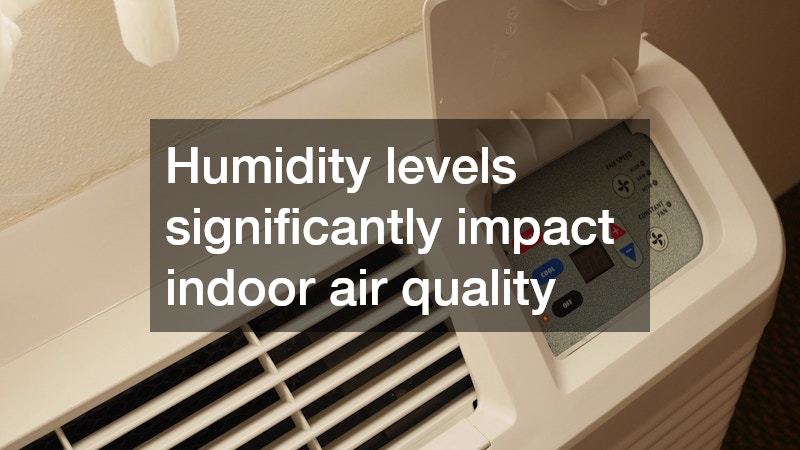Air quality in your home is crucial for maintaining a healthy living environment, and your HVAC system plays a pivotal role in this. When consulting with a local HVAC contractor, asking informed questions can help ensure your air quality needs are addressed effectively. Learn some of the most important questions you should consider discussing with your HVAC professional.
What Are the Signs of Poor Indoor Air Quality?
Indoor air quality can greatly affect your health and comfort. Common signs of poor air quality include persistent allergies, respiratory issues, and unusual odors. If you or your family members frequently experience these symptoms, it may be time to evaluate the air quality in your home.
Another indicator of compromised air quality is the accumulation of dust on surfaces and in vents. Excessive dust not only signifies that your air filters may be malfunctioning but also that contaminants are being circulated within your home. It’s essential to tackle these issues promptly to maintain a healthy living space.
Lastly, inconsistent indoor temperatures can also hint at poor air quality. Fluctuating temperatures often result from an inefficient HVAC system, which fails to regulate airflow properly. Addressing these signs with your HVAC contractor ensures that you maintain a stable and comfortable environment in your home.
How Can an HVAC System Be Improved for Better Air Quality?
One way to improve your HVAC system for better air quality is to upgrade your air filters. High-efficiency particulate air (HEPA) filters are an excellent choice, as they capture a higher percentage of particles, including allergens and bacteria. Discussing filter upgrades with your contractor can lead to a significant improvement in your indoor environment.
Implementing an advanced ventilation system can also enhance your HVAC’s ability to manage air quality. By introducing fresh outdoor air while expelling stale indoor air, these systems dilute pollutants and reduce their concentration. Your HVAC contractor can recommend the best ventilation solutions tailored to your home.
Routine system inspections can identify potential issues before they escalate, thereby ensuring optimal performance. Regular maintenance, such as cleaning ducts and checking for leaks, keeps your HVAC system efficient and contributes to better air quality. A proactive approach in collaboration with your contractor can yield substantial benefits.
What Air Filtration or Purification Options Do You Recommend?
Your HVAC contractor might suggest air purifiers as an effective solution for improving indoor air quality. Air purifiers work alongside your HVAC system to remove pollutants and can be particularly beneficial for households with pets or smokers. There are various models available, from portable units to whole-house systems, tailored to your needs.
Another option is UV light air purification. These systems use ultraviolet light to neutralize harmful microorganisms like bacteria and mold spores in your air ducts. By integrating a UV light purifier, you can effectively reduce the presence of these contaminants, resulting in cleaner and safer air.
For enhanced filtration, installing an electrostatic air filter can be advantageous. These filters use an electric charge to attract and capture particles, offering efficient purification without frequent replacements. Asking your HVAC contractor about the suitability of these options can help you make informed decisions about your home’s air filtration needs.
How Often Should HVAC System Maintenance Be Performed?
Routine maintenance is crucial for sustaining your HVAC system’s efficiency and enhancing indoor air quality. Generally, it’s recommended to have your system serviced at least twice a year—before summer and winter—as this ensures your system is prepared for peak usage periods. Your contractor can offer a customized maintenance schedule based on your usage patterns.
Maintenance tasks typically involve cleaning or replacing air filters, inspecting mechanical components, and verifying the system’s overall performance. Neglecting these essential steps can lead to decreased efficiency and poor air quality. Consistent maintenance not only prolongs the lifespan of your HVAC system but also upholds a healthier living environment.
Moreover, establishing a maintenance plan with your HVAC contractor provides peace of mind. Knowing that a professional routinely monitors your system prevents unexpected breakdowns and costly repairs. Regular check-ups facilitate early detection of potential issues, ensuring your home remains comfortable and air quality is optimized year-round.
What Impact Does Humidity Control Have on Air Quality?
Humidity levels significantly impact indoor air quality and comfort. High humidity fosters the growth of mold and dust mites, which can trigger allergies and respiratory problems. Conversely, low humidity can result in dry skin and irritated respiratory passages. Striking the right balance in humidity levels is essential for maintaining optimal air quality.
Your HVAC contractor may recommend integrating a humidifier or dehumidifier with your system to manage indoor humidity. Humidifiers add moisture to the air, beneficial in dry conditions, while dehumidifiers remove excess moisture, essential in damp climates. These additions ensure your home environment remains healthy and comfortable.
It’s important to regularly monitor humidity levels. Consulting with your HVAC professional aids in selecting appropriate tools and technologies for effective humidity control, ultimately enhancing your indoor air quality.
Improving the air quality in your home involves strategic planning and informed decisions about your HVAC system. By asking the right questions, you empower yourself with knowledge that can lead to a more comfortable and healthier living space. Consult with your local HVAC contractor to implement solutions that best suit your home’s needs.

